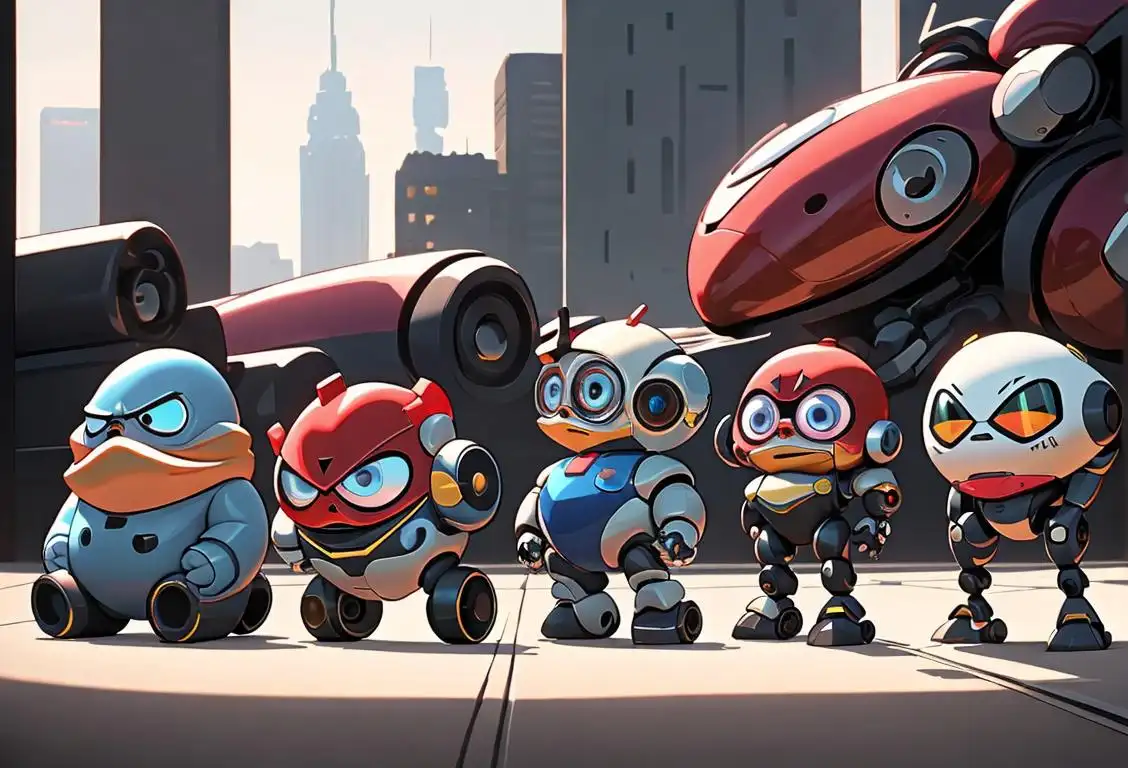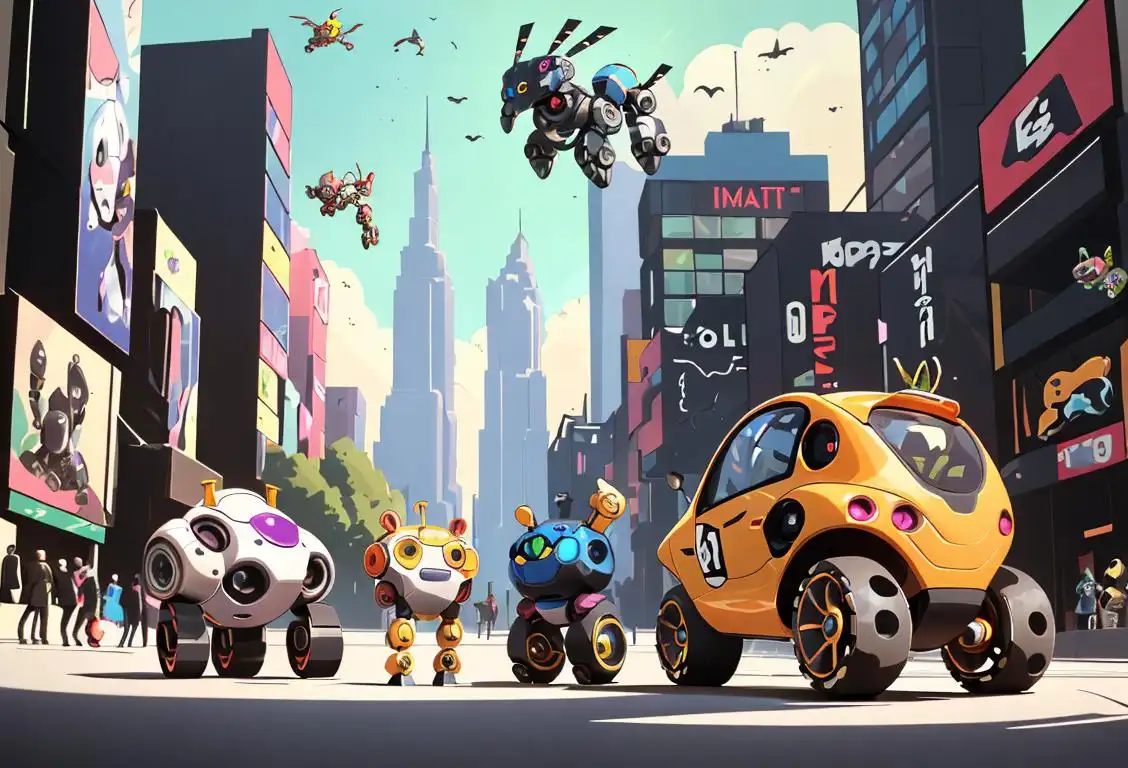National Diesel Day

Welcome to the fascinating world of National Diesel Day! This unique day celebrates the wonders of diesel fuel and all the amazing things it powers. Get ready to fuel up on knowledge with this fun and informative article!
When is Diesel Day?
It's national diesel day on the 18th March.
The Diesel Revolution
Before we dive into the exciting realm of National Diesel Day, let's take a quick trip down memory lane. Back in the late 1800s, a brilliant inventor named Rudolf Diesel introduced the world to a revolutionary new engine. This engine, known as the diesel engine, was more efficient and powerful than its predecessors.
Fast forward to today, and diesel engines are used in a wide range of vehicles, from cars and trucks to trains and ships. They are known for their fuel efficiency and durability, making them a popular choice in many industries.
Celebrating Diesel Power
Every year on National Diesel Day, enthusiastic diesel lovers gather to celebrate the incredible power and efficiency of this unique fuel. It's a day to appreciate all the ways diesel has shaped our world and continues to fuel our daily lives.
From transportation to agriculture, diesel plays a crucial role in powering our economy. It's not just about cars and trucks either—diesel generators keep the lights on during power outages, and diesel-powered machinery helps build the infrastructure we rely on.
Diesel Fun Facts
Did you know that the word 'diesel' is not just limited to engines? It's also used to describe a type of jeans! Diesel jeans are known for their high-quality denim and stylish designs. So next time someone mentions 'diesel,' don't assume they're only talking about engines!
History behind the term 'Diesel'
1892
Rudolf Diesel invents the diesel engine
In 1892, German engineer Rudolf Diesel invented the diesel engine, which was a significant technological advancement in the field of internal combustion engines. Unlike gasoline engines, diesel engines work on the principle of compression ignition, where the fuel-air mixture is ignited through the heat generated by compressing the air in the cylinder. This design allowed diesel engines to operate more efficiently and achieve higher fuel efficiency compared to their gasoline counterparts.
1892
Rudolf Diesel's Invention
In 1892, Rudolf Diesel, a German inventor and mechanical engineer, patented the diesel engine. Diesel designed this engine as an alternative to the prevailing steam engines of the time. His goal was to create an efficient internal combustion engine that could operate on a variety of fuels.
1897
Diesel engine makes its commercial debut
Five years after the invention of the diesel engine, in 1897, the first commercially successful diesel engine was introduced by the Consolidated Diesel Manufacturing Company. This engine showcased the immense potential of diesel engines in various industrial applications, such as powering ships, trains, and factories. The exceptional fuel efficiency and durability of diesel engines made them a preferred choice in industries where reliability and high power output were crucial.
1897
Exhibition at the World Exposition
Diesel demonstrated his engine to the world at the World Exposition held in Paris, France in 1897. This event showcased numerous advancements in technology and engineering. Diesel's engine attracted significant attention due to its efficiency and potential applications in various industries.
1903
The term 'diesel' is coined
The term 'diesel' was derived from the name of its inventor, Rudolf Diesel. In 1903, it was officially accepted and adopted as the common name for diesel engines and the fuel used in them. This decision was made during the World's Fair in Paris, where various diesel engine manufacturers and experts agreed upon the term 'diesel' to refer to this revolutionary technology.
1912
Adoption in the Maritime Industry
The diesel engine gained popularity in the maritime industry during this year. Its efficiency and economic advantages made it an attractive choice for ships. Diesel-powered vessels experienced reduced fuel consumption compared to steam-powered ones, enhancing their commercial viability. This marked a significant milestone in the widespread adoption of the diesel engine.
1912
Rudolf Diesel's mysterious disappearance
Tragically, in 1912, Rudolf Diesel, the brilliant inventor behind the diesel engine, mysteriously disappeared while traveling by ship from Antwerp to London. His sudden disappearance sparked numerous speculations and theories, including suspicions of foul play or personal reasons for vanishing. However, the true circumstances surrounding his disappearance remain unknown, leaving behind a mysterious legacy and adding an intriguing aspect to the history of the diesel engine.
1923
Usage in Automobiles
In 1923, the first diesel-powered automobile was introduced by Mercedes-Benz. The vehicle, called the Mercedes 6/25 PS, utilized a diesel engine that brought advantages such as improved fuel efficiency and greater torque. However, diesel engines faced challenges in terms of noise, vibration, and initial high costs, limiting their widespread adoption in the automotive industry.
1930s-1940s
Expansion and popularity of diesel engines
During the 1930s and 1940s, diesel engines experienced a significant expansion and surge in popularity. They became widely used in various sectors, including transportation, power generation, and heavy machinery. The advancements in diesel engine technology and the availability of diesel fuel in abundance contributed to their widespread adoption. Diesel engines played a crucial role in powering military vehicles, trucks, and ships during World War II, solidifying their importance and impact on the global stage.
1930s - 1940s
Dieselization of Railways
During the 1930s and 1940s, railways around the world began a process known as dieselization. This involved replacing steam locomotives with diesel-powered ones. Diesel locomotives offered better fuel efficiency, reduced maintenance costs, and increased reliability. The transition to diesel-powered trains revolutionized the railway industry and significantly improved transportation efficiency.
1970s-present
Diesel advancements and environmental concerns
In the 1970s, diesel engine technology underwent further advancements, including the introduction of turbocharging and direct injection systems. These innovations improved performance, efficiency, and reduced emissions to some extent. However, in recent years, concerns regarding diesel engines' impact on air pollution and particulate matter emissions have arisen. Stricter emissions standards and the development of cleaner alternatives, such as electric vehicles, have led to a decline in the popularity of diesel engines in certain regions.
1970s
Diesel Passenger Cars Gain Popularity
In the 1970s, diesel-powered passenger cars gained popularity, especially in Europe, as a response to the oil crisis. The fuel efficiency of diesel engines made them an attractive choice for cost-conscious consumers. However, concerns regarding air pollution and emissions led to stricter regulations and advancements in diesel engine technology.
2000s
Modern Diesel Engines
Modern diesel engines have undergone significant advancements in technology and emission controls. Common rail fuel injection systems, turbocharging, and exhaust gas recirculation have helped improve fuel efficiency and reduce emissions. Diesel engines are now used in a wide range of applications, including cars, trucks, ships, and power generators.
Did you know?
Did you know that diesel engines are so efficient that they can run on vegetable oil? That's right, you can technically power a diesel engine with leftover cooking oil from your favorite fast food joint. Talk about sustainable transportation!Tagged
fun celebration technologyFirst identified
18th March 2015Most mentioned on
18th March 2015Total mentions
25Other days
Robotnik Day
Init Day
System Administrator Appreciation Day
Diesel Day
Robot Day
Technology Day
Copy Paste Day
Wap Day
Deobi Day
Book Lovers Day








